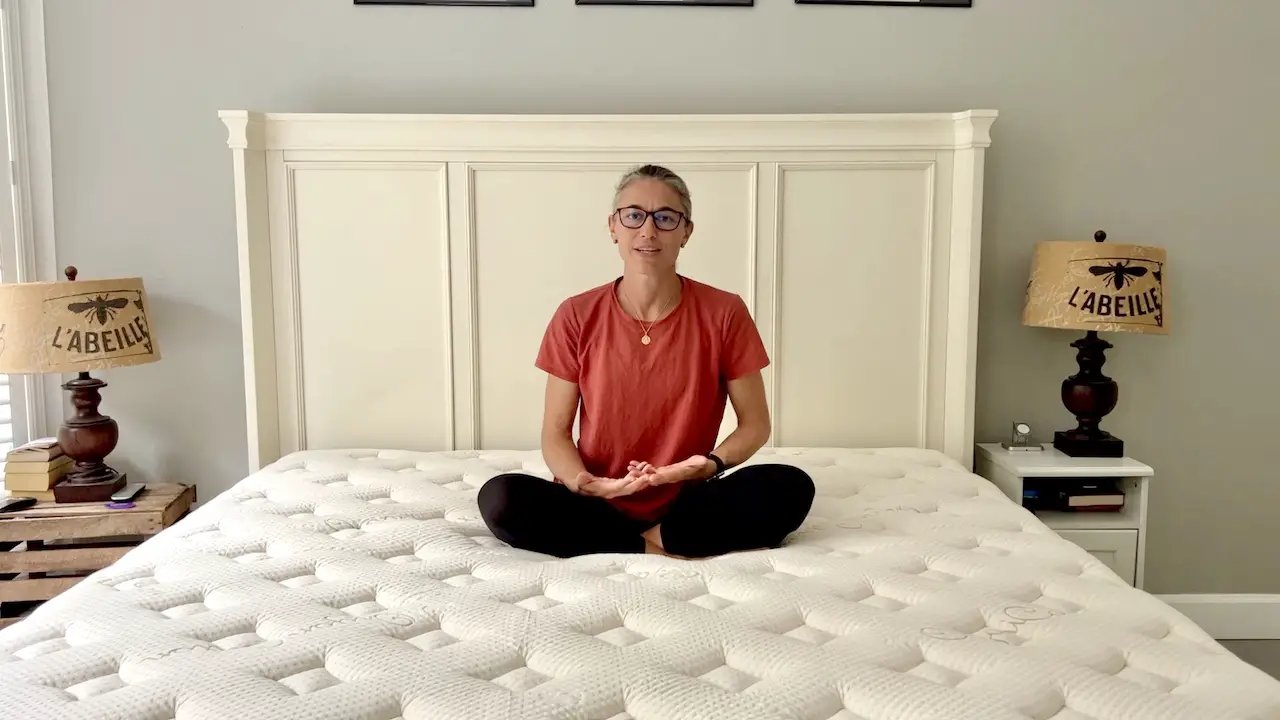HOW LONG BEFORE BEDTIME SHOULD YOU EXERCISE
Adapted For Each Exercise Routine
Exercise is essential for maintaining physical health, improving mental well-being, and promoting better sleep.
However, we are often asked, “How long before bedtime should you exercise?”
Finding the ideal timing for your workout routine can make a significant difference in your sleep quality and overall health. This article explores the relationship between exercise and sleep, the best practices for timing your workout, and tips for ensuring that your fitness routine does not disrupt your rest.
Table of Contents
How Exercise Affects Sleep
Understanding how exercise influences your body and sleep patterns is crucial for determining the right timing for your workouts.
The Benefits of Exercise for Sleep
Engaging in regular physical activity can enhance sleep quality in several ways, due to hormonal shifts in your body from the exercise:
Improves Sleep Onset: Exercise helps reduce stress and anxiety, making it easier to fall asleep.
Enhances Sleep Depth: Physical activity increases deep sleep, which is the most restorative sleep stage.
Regulates Circadian Rhythm: Exercise can help align your body’s internal clock, improving consistency in your sleep-wake cycle.
Reduces Insomnia: Regular workouts can decrease the time it takes to fall asleep and prevent night awakenings and insomnia.
The Potential Downsides of Late-Night Workouts
While exercise has numerous benefits, working out too close to bedtime may:
Increase heart rate and adrenaline levels, making it harder to fall asleep for a couple of hours after working out.
Raise body temperature, which can interfere with sleep.
Delay the production of melatonin, a hormone that signals your body to sleep.
How Long Before Bedtime Should You Exercise?
The optimal time to exercise depends on the type of activity, its intensity, and your individual sleep preferences. Here are general guidelines:
1. High-Intensity Workouts
High-intensity workouts such as weightlifting, CrossFit, or interval training are most likely to disrupt sleep if done too late. These activities elevate heart rate and stimulate the nervous system.
Ideal Timing: Complete high-intensity workouts at least 3 hours before bedtime.
Why: This allows your body to cool down and return to a relaxed state.
2. Moderate-Intensity Workouts
Moderate-intensity exercises, such as jogging, cycling, or yoga, are less likely to interfere with sleep but still require some buffer time before bed.
Ideal Timing: Finish moderate workouts 1.5 to 2 hours before bedtime.
Why: This gives your body sufficient time to relax and transition into a sleep-ready state.
3. Low-Intensity Workouts
Low-intensity activities like stretching, walking, or light yoga are generally safe to perform closer to bedtime.
Ideal Timing: You can perform these exercises up to 30 minutes before bed.
Why: Low-intensity activities promote relaxation and help prepare your body for sleep.
Best Times to Exercise for Better Sleep
To optimize your sleep quality, consider scheduling your workouts during these times:
Morning Workouts
Benefits: Morning exercise can improve alertness, regulate your circadian rhythm, and enhance sleep quality at night.
Drawbacks: Requires an earlier wake-up time, which may not suit everyone.
Afternoon Workouts
Benefits: Afternoon workouts align with natural dips in body temperature and energy, making them effective for boosting performance and sleep quality.
Drawbacks: May conflict with work or school schedules.
Early Evening Workouts
Benefits: Exercising in the early evening can relieve stress and improve mood without interfering with sleep.
Drawbacks: Requires careful timing to ensure it doesn’t occur too close to bedtime.
Factors That Influence Exercise Timing
Several individual factors can affect how long before bedtime you should exercise:
1. Personal Sleep Preferences
Night Owls: If you naturally sleep later, evening workouts may not disrupt your sleep.
Early Birds: Morning or afternoon workouts might be better suited to your schedule.
2. Exercise Intensity
Higher-intensity workouts require more recovery time before sleep. Adjust your schedule accordingly.
3. Stress Levels
If exercise helps you manage stress, a light evening workout might improve sleep quality despite being closer to bedtime.
4. Diet and Hydration
Avoid heavy meals and caffeine close to your workout and bedtime to prevent disruptions in sleep.
Tips for Balancing Exercise and Sleep
Follow these strategies to ensure your fitness routine complements your sleep schedule:
1. Cool Down Properly
Incorporate a cool-down period after your workout to lower your heart rate and relax your muscles. Stretching or light yoga can help and should be a part of your workout routine.
2. Create a Post-Workout Routine
Establish habits that signal your body it’s time to wind down, such as taking a warm shower or practicing mindfulness. Use this guide for your 7-to-10PM bedtime routine.
3. Monitor Your Sleep Patterns
Keep track of how your workouts affect your sleep using a fitness tracker or sleep app. Adjust your schedule based on your findings.
4. Choose the Right Intensity
Opt for lower-intensity workouts if you prefer exercising closer to bedtime.
5. Prioritize Consistency
Regular exercise is key. Try to stick to a consistent workout schedule that aligns with your sleep needs
Are There Sports To Avoid For Good Sleep
Certain sports and physical activities are more likely to interfere with sleep due to their intensity, competitive nature, or the stimulation they provide. If you are aiming for a good night’s rest, consider avoiding the following sports or activities close to bedtime:
1. High-Intensity Cardio
- Examples: Sprinting, HIIT (High-Intensity Interval Training), or competitive running.
- Why Avoid: These activities elevate heart rate and adrenaline levels, making it harder to relax and fall asleep.
2. Team Sports
- Examples: Soccer, basketball, volleyball.
- Why Avoid: The competitive and social aspects can increase adrenaline and stress hormones, delaying sleep onset.
3. Contact Sports
- Examples: Boxing, wrestling, or martial arts.
- Why Avoid: The physical and mental stimulation from these sports can keep your body in an alert state, hindering relaxation.
4. Weightlifting or Powerlifting
- Why Avoid: Heavy lifting increases cortisol levels, which can interfere with the production of melatonin, the sleep hormone.
5. Endurance Sports
- Examples: Long-distance cycling, swimming, or running.
- Why Avoid: Extended exercise sessions can delay recovery and lead to overheating, making it harder to sleep.
Tips for Athletes:
If evening is the only time you can work out, opt for lower-intensity activities like yoga, stretching, or light walking. These exercises can help calm the mind and prepare your body for sleep.
What Are The Best Sports To Sleep Well?
Certain sports and physical activities are particularly effective at preparing the body and mind for restful sleep. These exercises are typically low to moderate in intensity and help reduce stress, calm the nervous system, and promote relaxation.
1. Yoga
- Why It’s Good: Yoga incorporates deep breathing, stretching, and mindfulness, all of which help lower cortisol levels and prepare the body for sleep.
- Best Time: About 30 minutes to 1 hour before bedtime.
- Recommended Styles: Restorative yoga or Yin yoga focus on gentle movements and prolonged stretches that relax the muscles.
2. Walking
- Why It’s Good: A leisurely walk can help clear your mind, reduce anxiety, and regulate your mood before bed.
- Best Time: 15–30 minutes in the evening.
- Bonus: Walking outdoors may align your circadian rhythm by exposing you to natural light earlier in the day.
3. Tai Chi or Qigong
- Why It’s Good: These ancient practices emphasize slow, deliberate movements and focus on breathing and balance, making them great for reducing stress.
- Best Time: 1–2 hours before bedtime.
- Effect: Promotes mindfulness and a sense of calm, helping you ease into sleep.
4. Light Stretching
- Why It’s Good: Stretching relieves muscle tension, reduces aches, and improves blood flow, which can help signal to your body that it’s time to rest.
- Best Time: Right before bed as part of a wind-down routine.
5. Swimming
- Why It’s Good: Gentle swimming or floating in water can relax muscles and joints without overstimulating the body.
- Best Time: Early evening to avoid stimulating effects from prolonged physical activity.
6. Low-Intensity Cycling
- Why It’s Good: Casual cycling can increase endorphins without raising adrenaline levels too much, promoting a positive mood and relaxation.
- Best Time: 1–2 hours before bedtime.
7. Pilates
- Why It’s Good: Focuses on controlled movements and breathing, which help improve muscle relaxation and reduce stress.
- Best Time: Evening, as part of a relaxation routine.
Tips for Maximizing Sleep Benefits from Exercise
- Timing is Key: Aim to finish any activity at least 1–2 hours before bed, except for very gentle exercises like yoga or stretching.
- Hydrate Wisely: Avoid overhydrating late at night to prevent sleep interruptions.
- Listen to Your Body: Choose activities that leave you feeling calm and relaxed rather than energized or restless.
Incorporating these sleep-friendly sports into your evening routine can help improve sleep quality and overall well-being.
How Long Before Bedtime Should You Exercise - Final Thoughts
So, how long before bedtime should you exercise? The answer depends on the intensity of your workout and your personal sleep preferences. As a general rule:
Finish high-intensity workouts at least 3 hours before bed.
Allow 1.5 to 2 hours after moderate workouts.
Low-intensity exercises can be done closer to bedtime, even up to 30 minutes prior.
By tailoring your exercise routine to your sleep schedule, you can enjoy the benefits of both physical activity and restful nights. Prioritize consistency, monitor your sleep patterns, and adjust as needed to find what works best for you.
References
- John Hopkins Medicine. Exercising For Better Sleep. Retrieved from https://www.hopkinsmedicine.org/health/wellness-and-prevention/exercising-for-better-sleep
- Harvard Health. (2024). Does Exercising At Night Affect Sleep. Retrieved from https://www.ncoa.org/article/how-alcohol-affects-your-sleep/
- HealthLine. (2020). Working out Before Bed: Is It Good or Bad For Sleep. Retrieved from https://www.healthline.com/health/working-out-before-bed
FAQ
Most frequent questions and answers
Exercise timing can influence how quickly you fall asleep and the quality of your rest. High-intensity workouts too close to bedtime may disrupt sleep, while light exercises can promote relaxation.
Morning workouts are ideal for aligning your circadian rhythm and improving nighttime sleep, while evening workouts can be beneficial if kept low to moderate in intensity.
Not necessarily. Light or low-intensity exercises can promote relaxation and may even improve sleep for some individuals. However, high-intensity workouts are more likely to interfere with sleep if performed too close to bedtime.
Gentle activities like yoga, stretching, or a leisurely walk are ideal for evening exercise. These activities help relax your body and mind without overstimulating your system.
Exercise can enhance sleep quality but should not replace other good sleep hygiene practices, such as maintaining a consistent bedtime and creating a sleep-friendly environment.
How does exercise timing affect sleep?
Exercise timing can influence how quickly you fall asleep and the quality of your rest. High-intensity workouts too close to bedtime may disrupt sleep, while light exercises can promote relaxation.
Is it better to exercise in the morning or evening for sleep?
Morning workouts are ideal for aligning your circadian rhythm and improving nighttime sleep, while evening workouts can be beneficial if kept low to moderate in intensity.
Does exercising right before bed always disrupt sleep??
Not necessarily. Light or low-intensity exercises can promote relaxation and may even improve sleep for some individuals. However, high-intensity workouts are more likely to interfere with sleep if performed too close to bedtime.
What are the best exercises to do before bed?
Gentle activities like yoga, stretching, or a leisurely walk are ideal for evening exercise. These activities help relax your body and mind without overstimulating your system.
Can exercise replace other sleep aids?
Exercise can enhance sleep quality but should not replace other good sleep hygiene practices, such as maintaining a consistent bedtime and creating a sleep-friendly environment.
Share this deal with a friend!

Laura Georgieff
Laura is a mother of three who did not sleep through the night for the first 5.5 years of her kids' lives. She is passionate about sleep quality and loves sharing her experience and knowledge of all thing bedding! It is her mission to help you make the best decisions when it comes to sleep and help you get the best deal on the market!






